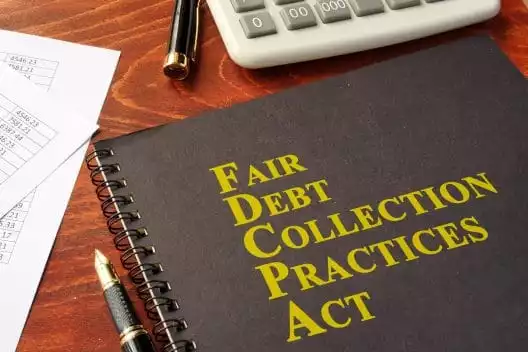The Fair Debt Collection Practices Act
One of the shadiest industries around is debt collection – and despite strict laws on what they can and can’t do, debt collectors routinely harass people, call their friends and family, collect old debts that are well past the statute of limitations, and all kinds of other practices that violate state or federal law.
If a debt collector is harassing you or trying to collect a debt you don’t owe, we may be able to help. Our firm uses a federal law – the Fair Debt Collection Practices Act – to protect people against unscrupulous debt collectors. They have to follow the rules just like anyone else, and we believe that when they don’t, there should be a penalty.
The Fair Debt Collection Practices Act (also called the FDCPA) can impose penalties up to $1,000 on a debt collector who breaks the law, as well as make them pay for your damages and attorney’s fees. Our firm will evaluate your case for free – we don’t charge for consultations. And if we think you’ve got a good claim, we take most of our cases on contingency, which means we don’t charge a fee unless we win.
If you think a debt collector might be doing something wrong, we’re happy to take a look at your case. We’ve seen people sued on old debts where the statute of limitations ran out long ago, people getting harassing calls, people being lied to about whether the taxes on their home were paid, and debt collectors that wouldn’t follow the rules no matter how much the consumer asked them to. We make them follow the rules and follow the law. Give us a call at 657-845-3100, or e-mail us at contact@kneuppercovey.com. One of our lawyers will review what happened and let you know what your options are.

How the FDCPA Can Help You
The FDCPA is a federal law passed in 1977 that was designed to protect people from aggressive debt collection practices. It set up very clear rules for debt collectors to follow, and it lets consumers sue them when they break the law. And you’d be surprised how often debt collection companies simply ignore the law. A few examples are below.
1) Zombie Debts
More and more people are being sued in small claims court over debts that get bought and sold by companies long after you thought you were done with them. There’s a term for that – “zombie debts.” You don’t actually owe them anymore because they’re so old that the statute of limitations has passed – but it doesn’t stop debt collectors from trying to bring them back from the dead. Sometimes they’ll call you up and try to trick you into making a payment or agreeing with them that you owe the debt—things that could revive the debt.
Sometimes debt collectors just sue on a zombie debt even though they legally can’t. While it varies by state, and we’d need to look at your specific case, the statute of limitations on debt is usually three to six years from when you stop paying. These companies are hoping you just don’t show up to court, and then they get a “default judgment”—winning automatically. A lot of people ignore them or don’t bother to call a lawyer. But those debt lawsuits are a clear violation of the FDCPA if the statute of limitations has passed.
2) Suing in Distant Courts
Some debt collectors sue in courts that are so far away from you, it’s hard to actually defend yourself. That’s also a violation of the FDCPA – they have to sue where the debt was signed, where you live, or where the home is if it’s a mortgage.
3) Harassing Calls
Some debt collectors call non-stop, even when you ask them not to. They call at weird hours. They call you at work. They might even threaten you or call you names, or use profanity, or insult you. They threaten to call the police. If a debt collector is doing things like that, they’ve probably violated the law, and we may be able to help.
4) Fake Law Firms or Courts
In extreme cases, debt collectors have pretended to be a law firm or even in a few notorious cases, pretended to be an actual court. In one case, a debt collection company set up a fake courtroom with a fake judge and fake bailiffs. They told people to show up to “court,” and then the fake judge threatened to have them arrested if they didn’t pay right then and there. Those aren’t as common, but trickery and lying is.
5) Harassing Friends, Family, and Employeers
Some debt collectors call your friends and tell them you’re a bad person or dump your private financial information onto them. Some call up your boss, or call you at work over and over again. Sometimes they try to get people fired from their jobs. None of this is ok, and none of it is legal.
Contact Us for a free consultation
If a debt collector is treating you badly, we may be able to help.
There’s no way to list all the illegal and abusive things debt collection companies do on a regular basis. There’s just too many. But if you feel like you’re being harassed, they’ve probably crossed the line. We’re always happy to take a look and see if there are any legal violations by a debt collector.
At Kneupper & Covey, our entire practice is based on representing consumers. We help people when they get treated badly by a business, and we don’t charge anything to review your case. In most cases we work on contingency, so we only get paid if we win. Call us at 657-845-3100, or e-mail us at contact@kneuppercovey.com. We’ll get in touch soon and let you know if you have a valid claim.
